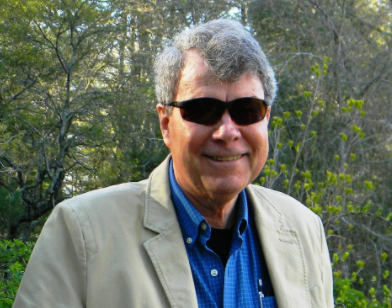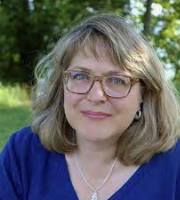Greetings, WesleyNexus Colleagues:
On May 1, Social media was ignited by the long expected announcement that the Global Methodist Church officially launched their new denomination, splitting off from the United Methodist Church. As UM News asked in the linked article above, “what’s next.”? On Facebook, the Progressive Methodist Group was particularly active. This month, WesleyNexus is highlighting some of the reflections addressing this question. We present thoughts from two retired United Methodist pastors, a well known United Methodist blogger Rev Jeremy Smith, author Diana Butler Bass, Baptist scholar Jason Oliver Evans and Peter Rollins, a radical theologian. In these essays, the authors reflect on who we are as Methodists and as Christians. The United Methodist Church will continue to engage each other in the ongoing task of discernment. We hope that you will receive some insights for your journey ahead whether you are a United Methodist or not.
Contents:
- IRAS Webinar: Evolutionary Consequences of the Atlantic Slave Trade: Epi-genetic, Cultural, Medical and Spiritual with Dr. Fatimah Collier Jackson, Ph.D
- Christianity in Process: Joining God in World Solidarity with John Cobb
- Pro-slavery, Anti-woman, Anti-Gay, Same Old Hermeneutic by Rev. John Alexander Wright
- Reflections on the Launch of the Global Methodist Church by Rev. Bill Trench
- Hacking Christianity: Shall Progressives Inherit the United Methodist Church? No. Not yet by Rev. Jeremy Smith
- Are we fearless? By Dianna Butler Bass
- Christians hold many views on Jesus’ resurrection – a theologian explains the differing views among Baptists by Jason Oliver Evans
- I deny the resurrection… by Peter Rollins
Thanks continue to go out to our generous contributors. We encourage you to share comments, articles and insights that will help us all weather these difficult times.
Blessings,
Rick Barr and the rest of the WesleyNexus team
****************************************************************************************************

Evolutionary Consequences of the Atlantic Slave Trade: Epi-genetic, Cultural, Medical and Spiritual with Dr. Fatimah Collier Jackson, Ph.D
The program will begin at 4:00 PM CDT, 5:00 EDT, 2:00 PM PDT, 10:00 PM BST.
Hosted by The Institute on Religion in an Age of Science
Presentation Overview:
Dr. Jackson is an expert on the bio-history of African peoples and their descendants in the transatlantic diaspora. She is widely recognized for her emphasis on interdisciplinary and integrative approaches to scientific research. In 2002, she co-founded the first human DNA bank in Africa (based at the University of Yaounde I in Cameroon) with the aim of changing the way that anthropological genetic research is done on the African continent (moving away from the colonial approach), enhancing local infrastructure and expertise, and dramatically improving the potential for scientific understanding of the interactions of genotypes and environmental factors in producing specific phenotypes (by providing a local context for data analysis and interpretation). Dr. Jackson’s research currently focuses on gene-environment interactions and the potential for changes in the epigenome induced by particular environmental stressors.
About the May 12th presenter:
Dr. Fatimah Collier Jackson, Ph.D is currently Professor of Biology at Howard University and Director of the W. Montague Cobb Research Laboratory where she overseas research on the Cobb Collection and the New York African Burial Ground Collection. Prior to that, Dr. Jackson was a Professor at the University North Carolina – Chapel Hill in Chapel Hill, NC and Professor Emerita, University of Maryland, College Park. Dr. Jackson received her BA, MA, and PhD from Cornell.
To register for the February 15 webinar:
https://us02web.zoom.us/webinar/register/WN_c5SBQWolQ8CufHX3s3xb0w
****************************************************************************************************
Christianity in Process: Joining God in World Solidarity with John Cobb
A 6 Week Exploration of Process Theology
Launching June, 2022

Each week during the class we will have a main session with John & Tripp exploring a central theme of Process theology. These sessions will center on Cobb’s mini-lecture and will be followed by conversation and QnA.
1) The Authority of Scripture
2) God’s Incarnation in Jesus
3) The Divine Relationality
4) The Human Experience of God – “Law & Grace”
5) The “Kingdom of God”
6) Life After Death
For more information: https://homebrewedchristianity.lpages.co/christianity-in-process/?fbclid=IwAR2Rb9yNlqp42gjPWGavEPPy3pmeQ7IM155kV-meJZem0tOBVyuNmrfh08I
****************************************************************************************************
PRO-SLAVERY, ANTI-WOMEN, ANTI-GAY, SAME OLD HERMENEUTIC by Rev. John Alexander Wright

The Global (i.e., Anti-Gay) Methodist Church is set to launch this Sunday (May 1). Ah, the more things change, the more they stay the same.
Just as the old southern Methodist church claimed allegiance to the supreme authority of Scripture in its defense of slavery, so also the GMC professes allegiance to the supreme authority of Scripture in its opposition to same-sex marriage and to the ordination of same-sex married persons. The GMC would have the world believe that we mainstream and progressive United Methodists deny Scripture’s authority altogether. But that is just not so. We follow a different biblical hermeneutic.
In his book “The Civil War as a Theological Crisis” (which my men’s book group happened to be reading this week), Mark Noll contrasts two radically different hermeneutics. (1) Those who argued that the Bible prohibited slavery employed, as he puts it, a “nuanced” hermeneutic: “This [anti-slavery] position could not be read out of any one biblical text; it could not be lifted directly from the page. Rather, it needed patient reflection on the entirety of the Scriptures; it required expert knowledge of the historical circumstances of ancient Near Eastern and Roman slave systems as well as of the actually existing conditions in the slave states; and it demanded that sophisticated interpretative practice replace a commonsensically literal approach to the sacred text.” For these reasons, Noll argues, this “nuanced” anti-slavery hermeneutic was doomed to fail.
(2) In contrast to this “nuanced” hermeneutic, Noll describes the “uncomplicated” hermeneutic by which the legitimization of slavery was read out of the infallible text: “First, open the Scriptures and read, at say Leviticus 25:45, or, even better, at I Corinthians 7:20-21. Second, decide for yourself what these passages mean. Don’t wait for a bishop or a king or a president or a meddling Yankee to tell you what the passage means but decide for yourself. Third, if anyone tries to convince you that you are not interpreting such passages in the natural, commonsensical, ordinary meaning of the words, look hard at what such a one believes with respect to other biblical doctrines. If you find in what he or she says about such doctrines the least hint of unorthodoxy, as inevitably you will, then you must rest assured that you are being asked to give up not only the plain meaning of Scripture [in support of slavery], but also the entire trust in the Bible that made this country into such a great Christian civilization.” [pp. 49, 50]
Likewise, the GMC employs the same “uncomplicated,” a-historical, commonsensical hermeneutic. It never stops to ask how the historical context of Lev. 20:13 in which there was no concept of “sexual orientation” differs from today’s understanding of psycho-sexual genesis and development. It refuses to distinguish the ancient assumption that all same-sex acts constituted an exploitative violation of human ‘nature’ from the contemporary recognition that for gay and lesbian persons same-sex marriage constitutes the loving expression of their authentic sexual nature in a mutually committed covenantal relationship just as opposite-sex marriage does so for heterosexual persons. It reads the so-called “clobber” texts in isolation from, in Noll’s words above, the “patient reflection on the entirety of the Scriptures,” especially the love commandment of Jesus.
+ + +
Albert Outler tried to save us Methodists from such commonsensical literal biblicism with his “quadrilateral”: “Wesley believed that the living core of the Christian faith was revealed in Scripture, illumined by tradition, vivified in personal experience, and confirmed by reason” (2016 Book of Discipline, p. 82).
But . . .the more things change, the more they remain the same.
+ + +
Over seventy years ago, H. Richard Niebuhr pointed out that fundamentalist culture warriors who perceive themselves as defending the gospel against accommodation to secular culture more often than not “show a greater concern for conserving the notions of [older cultural epochs] than for the Lordship of Jesus Christ. . .More significant is the fact that the mores they associate with Christ have at least as little relation to the New Testament and as much connection with social custom as have those of their opponents” [Christ and Culture, p. 102] In other words, they are as much an expression of cultural Christianity as are those they oppose.
But, as I have said, the more things change, the more they stay the same. Alas, when will we ever learn?
Facebook post February 29, 2022, Progressive Methodist Group
https://www.facebook.com/groups/progressivemethodists/posts/4363186053784833
Rev. John Alexander Wright, now retired, was the District Superintendent at Hill Country District, Rio Texas Conference, The United Methodist Church and pastor of First United Methodist Church of Austin and Grace United Methodist Church. He studied Systematic Theology at Southern Methodist University where he studied systematic theology with noted process theologian Schubert Ogden.
****************************************************************************************************
REFLECTIONS ON THE LAUNCH OF THE GLOBAL METHODIST CHURCH by Rev. Bill Trench

I read Bishop Mike Lowry’s letter of resignation from the Council of Bishops and the United Methodist Church “with a heavy heart and deep grief…” This is a major issue for the church, but for me it is also deeply personal.
The Methodist Church that welcomed me as an infant was a central part of the liberal mainstream of American Protestantism. We embraced science and biblical scholarship and the moral evolution of our society. In those years the mainstream offered a very big tent. Pretty much anyone could belong. And folks often concluded a discussion of religious differences with the closing remark that they were glad “we are all going to the same place.”
Half a century earlier, in the years when evangelicals were also progressives, Walter Rauschenbusch had declared that progress was not just inevitable, it was also divine. By which he did not mean that everything that happened was good, but rather that God expected us to make progress, morally and politically as well as scientifically.
I was eight years old when the great Methodist theologian Georgia Harkness wrote, “Understanding the Christian Faith.” Her chapter on “Understanding the Bible” lays out the perspective I grew up with, that the Bible is a sacred book, written over a period of about a thousand years. It is “heavenly treasure in earthen vessels.” It was not written for scientific or historical accuracy, but to convey the timeless message of God’s love and care. Some of it is time bound by the culture in which it was written, but at its heart it holds timeless truths about God and humanity. It is up to us, as we read the Bible, to separate the heavenly treasure from the earthen vessels.
Writing about “Jesus Christ Our Lord,” she states, “The question as to whether Jesus was born of a virgin is one on which the opinion of Christians differ, and the biblical accounts do not throw clear light upon it.” And on the resurrection, she declares, “We cannot be sure of the details of what happened that first Easter morning, but the central fact is certain. To the disciples . . . their Leader was not dead but present with them.” If she were alive today, we might call her a Progressive Christian. But in her own time, for a Methodist, her theology was predictably orthodox.
“Religion is perhaps its own worst enemy,” she wrote. “For religion, masquerading under the guise of archaic creeds, and impossible literalisms, and ecclesiasticism indifferent to human needs, has brought about an inevitable and in many respects wholesome revulsion.”
I was ordained when the church embraced “theological pluralism.” We understood faith, not in the reciting of creeds or the enforcement of doctrines, but in a journey that was both individual and communal. We were growing and changing and learning new things. In the words of the great abolitionist James Russell Lowell:
“New occasions teach new duties,
Time makes ancient good uncouth;
They must upward still and onward,
Who would keep abreast of truth.”
When Bishop Eddie Carroll put his hands on my head on a hot summer day in the chapel at Mount Holyoke College in 1973 he said, “take thou authority” to preach and teach and lead the church into the future. Bishop Carroll came out of the old Central Jurisdiction so he was well aware of the legacy of a past that was far from perfect. He knew that change was necessary and expected, as I did, that the church we served would continue to grow and learn. We would continue to pray and work for the coming of God’s kingdom “on earth as it is in heaven.”
But all of that began to change almost immediately with the birth of the Institute on Religion and Democracy. The stated goal was to renew the mainline churches, by which they meant to move the churches away from social justice. Soon there was Good News and then the Confessing Movement and the Wesleyan Covenant Association and, finally the launch today of the Global Methodist Church. Each iteration seemingly more rigid and dogmatic than the previous ones leading us back to the religion that Georgia Harkness so eloquently dismissed.
I still believe in the big tent. It pains me that the GMC folks are so opposed to the inclusion of gay folks that they can’t bear the thought that somewhere in a Methodist Church a same sex couple is committing to love one another forever. But even with that I don’t want them to leave because I believe that most of them will change. And the truth is that one of the reasons they are leaving is because they are afraid that if they don’t leave, they will change. Some won’t, but most will. They will have a gay child or a gay grandchild or a gay neighbor, and they will choose love over doctrine.
I am grieved by their leaving, but I am even more grieved by the damage they have caused. First and foremost they have done grave harm to LGBTQ folks. Their “beliefs” have encouraged and enabled bullying, ostracism, discrimination, and physical harm. The pain they have inflicted is immense. And, sadly, they will continue to inflict that pain with a new label.
And beyond the harm to LGBTQ folks, they have done immense and probably irreparable harm to the whole Christian Church. We will forever have to explain as Brian McLaren said, that we are not “that kind of Christian.”
Facebook post May 1, 2022
https://www.facebook.com/bill.trench/posts/10208727790989821
Rev. Bill Trench
Retired United Methodist Church pastor. Prior to retirement, Rev Trench was pastor of East Greenwich UMC. and New England Conference of the United Methodist Church. He earned a Ph.D. in Systematic Theology and Christian Social Ethics from Boston University.
****************************************************************************************************
Hacking Christianity: Shall Progressives Inherit the United Methodist Church? No. Not yet by Rev. Jeremy Smith

Traditionalist caucus groups like to draw out the extremes of progressive expressions and claim, “this is what The UMC will look like.” But is that true? Will United Methodism suddenly become this bastion of progressivism at last, inclusive of all LGBTQ+ persons, progressive theological claims on God and Jesus, dogs & cats living together, mass hysteria?
No. They won’t. And math and polity are the reasons why.
****************************************************************************************************
Are we fearless? By Dianna Butler Bass

A wee reminder to my UMC friends — Methodism began as a spiritual movement to renew a decaying institutional church and serve the outcast, the marginalized, and the poor.
It is the WCA “traditionalists” who are NOT traditional. They are like 18th century Anglicans (sorry Anglican friends!) who tried to quash a spiritual movement of inclusion and love.
It is the WCA “traditionalists” who are appealing to authority and order and ecclesial control — like the Anglican bishops who criticized and chastised John Wesley and the early Methodists.
Early Methodism was messy, based in small groups, empowered women, gave enslaved persons a sense of freedom, and created a vision of justice and liberation.
There is NOTHING “traditional” about Methodists saying “no” to the Spirit’s movements of liberating love.
More traditional Christians were horrified by Methodism. They thought it was a faith for the “unwashed rabble.”
Anyone who claims to be a Methodist but who acts like an 18th century Anglican prelate is NOT faithful to Methodist tradition.
Anyone who says there are limits to whose hearts get strangely warmed are NOT faithful to Methodist tradition.
The deepest Methodist identity is that of hearts on fire with love, of risk and rebellion, of holy revolutions, of challenging ecclesial authorities who say “NO,” of listening to the voices of the outcast.
The people who are currently claiming to be “traditional” are really innovators and revisionists. They are turning you into something you aren’t.
If you want to open your doors, open the table, love those who society hates, risk all for the sake of mercy, well, then you are real Methodists.
So remember: John Wesley did not start a church. He wanted to renew a church that had become narrow, moralistic, cold. He wanted to renew it through new hearts, a courageous spirit, community that included the least & the unwanted, and passion for Jesus.
It was a FEARLESS spiritual movement.
FEARLESS. Without courage and risking all for love, there would be no Methodists.
Be not afraid. Be traditional! Be fearless. Go forth. Hearts on fire. You are being called back to your roots. The world is your pulpit.
Don’t let anybody — don’t let any rule — silence you. Wesley didn’t.
The great historian Don Matthews wrote that early American Methodism was “a volatile, alienated, defiant, and charismatic” movement that empowered “those who were demeaned and degraded” w/a revolutionary sense of God’s liberating love. (“Religion in the Old South,” UChiPress)
If you don’t know that history, learn it. Methodism only got “nice” when it accommodated to slavery. So, the “traditionalist” Methodism that is taking over your church is complicit with white supremacy & slave-holding.
But there was always another Methodism — the kind that shook the American South to its core in the 18th century — the revolutionary, inclusive, heart-centered, Jesus-fired Methodism that scared authorities (mostly white men, according to Matthews).
It is time for colonized Methodism to go away and the real Methodist tradition to get reborn (Methodists like rebirths!). To be the rambunctious rebels against unjust societies and the unholiness of the dominions of this world.
And yes, Methodists once scared people.
ISN’T THAT GREAT?!
And the people they scared the most were white male land — and slave — holders.
METHODISTS SCARED THE RIGHT PEOPLE.
But the powerful got you — twisted your desire for holy living into niceness and used your longing for a new spiritual order into a polity of conformity to control your raging, risky Methodist hearts.
They scared you with threats of chaos and loss of status and even the possibility of your livelihoods.
And isn’t that interesting? Just when Methodists are getting brave again, standing up for those w/o voice, including the excluded, redressing racism and working for women’s equality, the heirs to those 19th century white guys basically come back threatening all the same stuff.
Do NOT let them do it again.
Fool you once.
Set history a-right. You’ve got a real chance here to be the sort of Methodists your founding generation dreamed.
(Twitter thread – March 3, 2019) Posted by John Petterson
https://www.facebook.com/photo/?fbid=10224811722513486&set=gm.4225506497552790
****************************************************************************************************
Christians hold many views on Jesus’ resurrection – a theologian explains the differing views among Baptists by Jason Oliver Evans
Given this diversity of perspectives on the resurrection, Baptists are not unique among Christians in engaging matters of faith practice. However, I argue that Baptists may be distinct in that they believe that such matters must be freely believed by one’s own conscience and not enforced by any external religious authority.
Jason Oliver Evans is a Ph.D. candidate in the Department of Religious Studies at the University of Virginia. A scholar of Christian thought, Evans primarily studies Christology, soteriology, creation, and theological anthropology. In his work, Evans considers how identity, race, sexuality, and gender more broadly factor into the study of Christian faith and practice. Evans’ other research interests include African American theology and religion, liberation theologies, Africana studies, gender and sexuality studies, Trinitarian theology, theological and social ethics, Scripture and theological hermeneutics, and the thought of 20th-century Reformed theologian Karl Barth. Evans is also a podcast contributor to the Religion, Race, and Democracy Lab at the University of Virginia.
****************************************************************************************************
I deny the resurrection… by Peter Rollins
I deny the resurrection of Christ every time I do not serve at the feet of the oppressed, each day that I turn my back on the poor; I deny the resurrection of Christ when I close my ears to the cries of the downtrodden and the oppressed.
Every time I do not serve my neighbour, every time I walk away from the poor.
I deny the resurrection every time I participate in an unjust system.
However there are moments when I affirm that resurrection, few and far between as they are.
I affirm the resurrection when I stand up for those who are forced to live on their knees,
I affirm the resurrection when I speak for those who have had their tongues torn out,
I affirm the resurrection, when I cry for those who have no more tears left to shed.
I affirm the resurrection each and every time I look into your eyes and see the face of Christ.”
Peter Rollins, Irish theologian and philosopher
